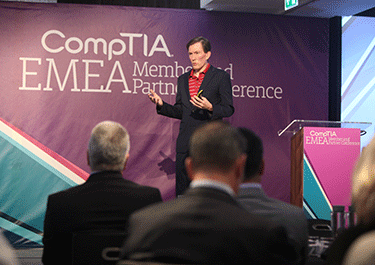
Day two of CompTIA EMEA Conference 2017 began with a keynote speech by CompTIA President and CEO Todd Thibodeaux outlining the most transformative technologies, the historical context of these advances, and how different sectors, job roles and wider society are likely to be affected.
Every generation thinks they are undergoing huge technological change. Between 1880 and 1920, for example, the rapid introduction of modern medicine, cars and aeroplanes had a huge impact on people’s personal lives. Today’s transformative technologies – AI, autonomous vehicles, robotics and VR – are having direct impact on many industries, job roles and the concept of work.
Thibodeaux argued the five industries most likely to feel impact are:
- Leisure / hospitality: Virtual reality will enable people to have amazing experiences – visit the pyramids, ski in the Alps – without leaving their homes. Leisure companies know their bottom line is really at risk. Even a five percent reduction in travel will have a huge impact.
- Insurance: Autonomous vehicles pose a huge threat to car insurance. If we stop owning vehicles and drive less, insurers stand to lose out.
- Medical industry: Artificial intelligence systems that can diagnose a patient and precision medicine are just a couple of examples of the technological change in this industry. A recent study showed how artificial intelligence can even identify Alzheimer’s disease.
- Legal and accounting: Artificial intelligence systems have been proven to be better at reviewing and drafting certain contracts, meaning that the days of humans performing these tasks are numbered.
- Education: AI can have a profound impact on education, offering a more consistent quality of learning. CompTIA is adopting artificial intelligence as part of its assessment programme to provide a more authentic real-world test of candidates’ ability.
However, while technology is replacing many jobs, it is not necessarily creating new ones. Only five percent of the jobs created in the last 10 years come from the technology sector, and nine out of 10 workers are in jobs today that existed 100 years ago.
So what job roles are most at risk?
- Radiologists: In the future it is entirely feasible that if you have a broken arm, you could walk into a clinic where an artificial intelligence system performs facial recognition to verify your identity, you are then directed into the X-ray department where your arm is scanned and a bespoke cast is 3-D printed for you in 20 minutes.
- Insurance claims adjusters: Instead of sending out a claims adjuster to take notes following a crash, an insurer could send a drone that would take photographs. No human interaction would be required and a quote could be generated with minimal delay.
- Drivers of anything: The number one career for 18 to 31 year olds is driving things. The move towards autonomous vehicles will advance rapidly in the next five to seven years, and may leave 500 million people unemployed.
- Psychologists / psychiatrists: Artificial intelligence systems can be better at diagnosing psychological issues such bipolar disorder, and younger people are more receptive to online counselling, as it can be faster and more accurate.
- Software developers: In the future, we may laugh at how much coding we do today. Software developers will only be needed for high-level jobs. Tasks like designing email templates and simpler software development tasks will be automated and outdated.
So, what does all this mean for the future of society? There are three possibilities. Firstly, one of abundance and leisure, where governments heavily tax the large technology companies and provide people with a universal basic income. People would become disengaged with work, and reengaged with life.
The second is a world of creativity, not consumption, where people have the time to think more creatively as time-consuming admin is automated.
The third is a more dystopian case of find-work-where-you-can-get-it, with people barely able to cover the cost of living through work. Arguably, this is starting to happen now.
So, what will we do with ourselves? CompTIA is taking this issue incredibly seriously, and is creating a dedicated workforce think-tank to be the voice of the industry in the wake of automation. Stay tuned for updates.
For more information, read the article “A World Without Work,” which explains how the moment where machines would make workers obsolete may finally be arriving. And click here to get full coverage of the EMEA Member and Partner Conference!
